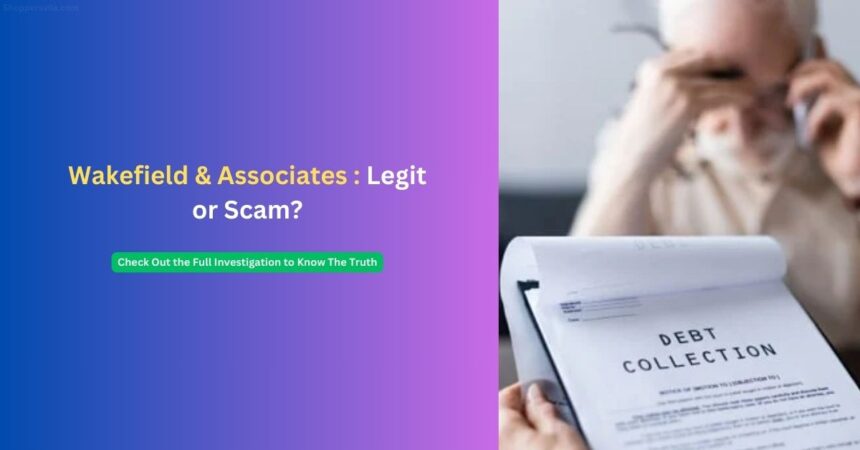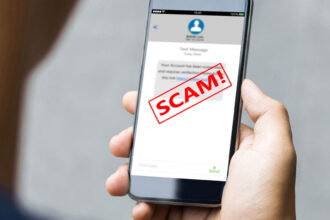Wakefield & Associates is a legitimate debt collection agency that has been in business since 1986. However, scammers are now taking advantage of this company’s reputation by making fake collection calls and sending fraudulent letters demanding payment. This article will expose how the Wakefield scam works, provide consumer complaints, and give tips on how to avoid falling victim.
Revealing the Wakefield and Associates’ Fake Debt Collection Scam
In the typical Wakefield scam, victims receive calls or letters claiming they owe money to a creditor and that Wakefield & Associates is attempting to collect on the debt.
The scammers often use intimidation tactics to get victims to pay quickly. However, when victims investigate further, they discover they do not actually owe any money and the contact is not from the real Wakefield company.
This swindle takes advantage of the company’s reputation to try to trick victims into thinking the debt and collection attempt is real. But the contact is not legitimate and any payments made will go straight to criminals. Be wary of any suspicious calls or letters seemingly from Wakefield.
How the Whole Racket Works?
The Wakefield fraud usually starts with a phone call out of the blue. The caller claims to be from “Wakefield and Associates” and says you owe money to a creditor they are attempting to collect for. They may reference a fake case number and demand payment right away.
If you refuse, the fraudster turns aggressive and threatens further action. They often call repeatedly to harass victims. Some victims have received fake “legal documents” letters in the mail with Wakefield’s logo, detailing a made-up debt owed.
When victims investigate the debt further or contact the supposed original creditor, they find no record of owing anything. The scammers are just impersonating Wakefield and making up debts to frighten people into paying. Any money sent will be pocketed by criminals.
Consumer Reviews and Complaints Expose the Deception
Many victims of the Wakefield & associates racket have posted reviews warning others. Here is one example:
Someone called claiming to be from Wakefield Associates demanding I pay $1,200 immediately. They said I owed this debt to a hospital and they would take legal action if I didn’t pay today. I knew I didn’t owe anything, so I called the hospital directly. They confirmed I had no bills with them at all! This was 100% a scam trying to steal money by pretending to be Wakefield.
Victims describe the fake collectors as rude, aggressive, and often barely comprehensible. They receive threats of lawsuits or arrest that never materialize. Any supposed debts can’t be verified with creditors. Overall, these fraud calls aim to intimidate people into immediate payment.
How to Identify a Legitimate Debt Collector
Since fraudsters often pretend to be from Wakefield, it’s important to know how to verify a real collector contacting you:
- Ask for validation of the debt – By law, real collectors must provide this if you request it. Scammers typically cannot validate fake debts.
- Research the company – Visit the real company’s website and call their listed phone number to verify if they are actually trying to reach you.
- Contact the original creditor – Any legitimate past due accounts should be on file with the creditor. Ask them to confirm the collector is authorized on the debt.
- Check for proper identification – Real Wakefield agents will provide a company ID number and address. Fraudsters don’t want to be traced.
- Request communication in writing – Ask for a mailed letter detailing the debt before providing any information. Scammers prefer intimidating phone calls.
Fair Debt Collection Practices Act
Understanding your rights under the FDCPA can help protect against scams. This law prohibits:
- Harassing calls at unreasonable hours
- Threatening arrest or legal action not actually intended
- Falsely representing the amount or status of a debt
- Collecting on debts not actually owed
Document any violations and report offender’s name, company, number, etc. You can file complaints with the CFPB and FTC that may lead to investigations of fake collectors.
How to Avoid Wakefield impersonation Scams
Here are some top tips to avoid becoming a victim:
- Be wary of any unexpected calls/letters demanding payment. Scammers count on catching you off guard.
- Never give personal information or payment over the phone until you verify the call is legitimate.
- Research Wakefield’s real contact info and reach out to them directly if unsure.
- Always get debts validated in writing directly through creditors before paying.
- Understand your FDCPA rights against harassment and false threats.
What to Do if You’re Targeted by The Fraudsters
If you receive a suspicious call or letter seemingly from Wakefield:
- Report it immediately to the real Wakefield & Associates so they can investigate fraudsters misusing their name.
- File complaints with authorities like the FTC, CFPB, and your state attorney general.
- Warn others about the racket posing as Wakefield collectors online and in your community.
- If you lost money, contact your bank and also report it to local law enforcement.
Frequently Asked Questions About Wakefield and Associates
1. Are all Wakefield calls or letters scams?
No, the real Wakefield and Associates is a legitimate collector. But scammers often pretend to be them and collect fake debts.
2. How do scammers get my personal information?
They buy stolen information online or make educated guesses. Protect your info by avoiding sharing details with unknown callers.
3. What should I do if Wakefield sues me?
Do not ignore legal cases against you. Respond with the help of a consumer rights attorney. But scammers rarely actually file lawsuits, they just threaten them.
4. Where do I report about Wakefield & Associates?
You can file complaints with the FTC, CFPB, your state attorney general, and the real Wakefield company to alert authorities.
The Bottom Line
Fraudsters are impersonating Wakefield and Associates debt collectors to steal money by collecting phantom debts. Protect yourself by never paying just based on a phone call, independently verifying debts, understanding your rights, and reporting contact from fake collectors.
Authorities are working to identify and prosecute criminals conducting Wakefield impersonation scams and other abusive collection practices.
With awareness and caution, consumers can avoid becoming victims and help authorities go after scammers pretending to be Wakefield.





























